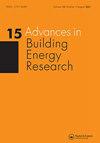Initial approximation of the implications for architecture due to climate change
IF 2.5
Q2 CONSTRUCTION & BUILDING TECHNOLOGY
引用次数: 23
Abstract
ABSTRACT This review paper organizes and summarizes the literature regarding climate change impacts on future building energy demand. The approaches used for the creation of future weather climate and building renovation scenarios, as well as building energy modeling at different scales, are evaluated. In general, it can be concluded that future heating demand could decrease (7–52%), while cooling demand could increase significantly (up to 1050%). The decrease/increase rates varied significantly depending on the climate and case study building(s) considered, with buildings and building energy systems located in extreme climates being more sensitive to such changes. The main uncertainty of the predicted increase/decrease rates can be assigned to climate models and forecasted weather data. Nonetheless, such forecast and risk assessment are necessary for sustainable development of urban environment and associated energy systems. Further development of dynamic large-scale building energy simulation tools is required, along with the development of large-scale building renovation measures and strategies that take into account additional aspects (such as economic and societal). Moreover, continuous efforts are required in further climate models’ improvement and uncertainty reduction.气候变化对建筑影响的初步近似值
摘要:本文对气候变化对未来建筑能源需求影响的相关文献进行了整理和总结。评估了用于创建未来天气气候和建筑改造方案的方法,以及不同尺度的建筑能源建模。总的来说,可以得出结论,未来的供暖需求可能会减少(7-52%),而制冷需求可能会显著增加(高达1050%)。减少/增加的比率根据气候和所考虑的案例研究建筑物而有很大差异,位于极端气候中的建筑物和建筑能源系统对这种变化更为敏感。预测增减率的主要不确定性可归因于气候模式和预报的天气资料。然而,这种预测和风险评估对于城市环境和相关能源系统的可持续发展是必要的。需要进一步开发动态的大型建筑能源模拟工具,以及考虑到其他方面(如经济和社会)的大型建筑改造措施和策略的发展。此外,需要在进一步改进气候模式和减少不确定性方面继续努力。
本文章由计算机程序翻译,如有差异,请以英文原文为准。
求助全文
约1分钟内获得全文
求助全文
来源期刊

Advances in Building Energy Research
CONSTRUCTION & BUILDING TECHNOLOGY-
CiteScore
4.80
自引率
5.00%
发文量
11
 求助内容:
求助内容: 应助结果提醒方式:
应助结果提醒方式:


